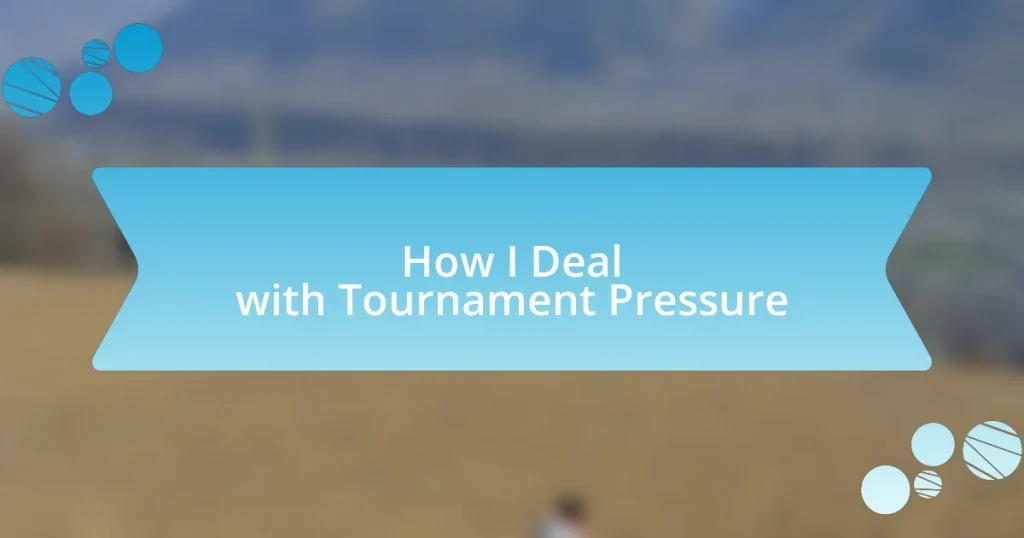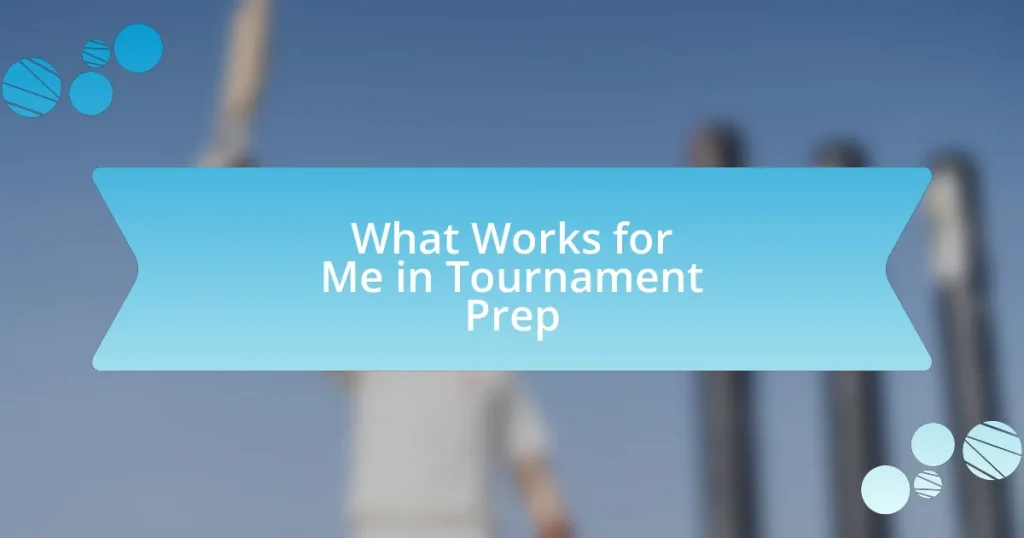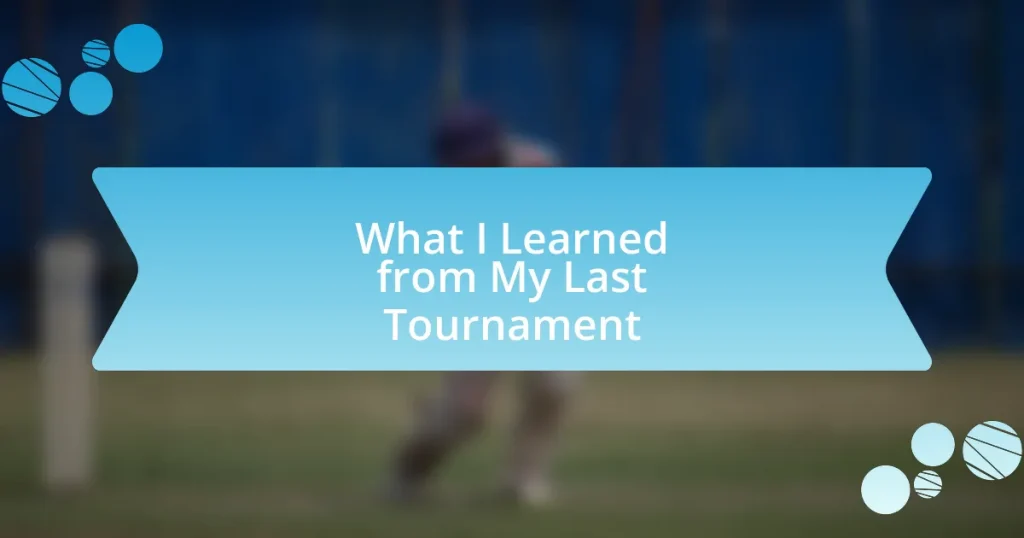Key takeaways:
- Tournament pressure can be transformed from a negative feeling into a source of motivation by changing one’s perspective.
- Recognizing personal stress signals, such as increased heart rate or difficulty focusing, is essential for managing tournament pressure effectively.
- Developing a consistent pre-game routine, including stretching, visualization, and healthy eating, helps to build confidence and reduce anxiety.
- Building a support network with friends, teammates, and mentors provides reassurance and shared experiences that alleviate stress during competition.
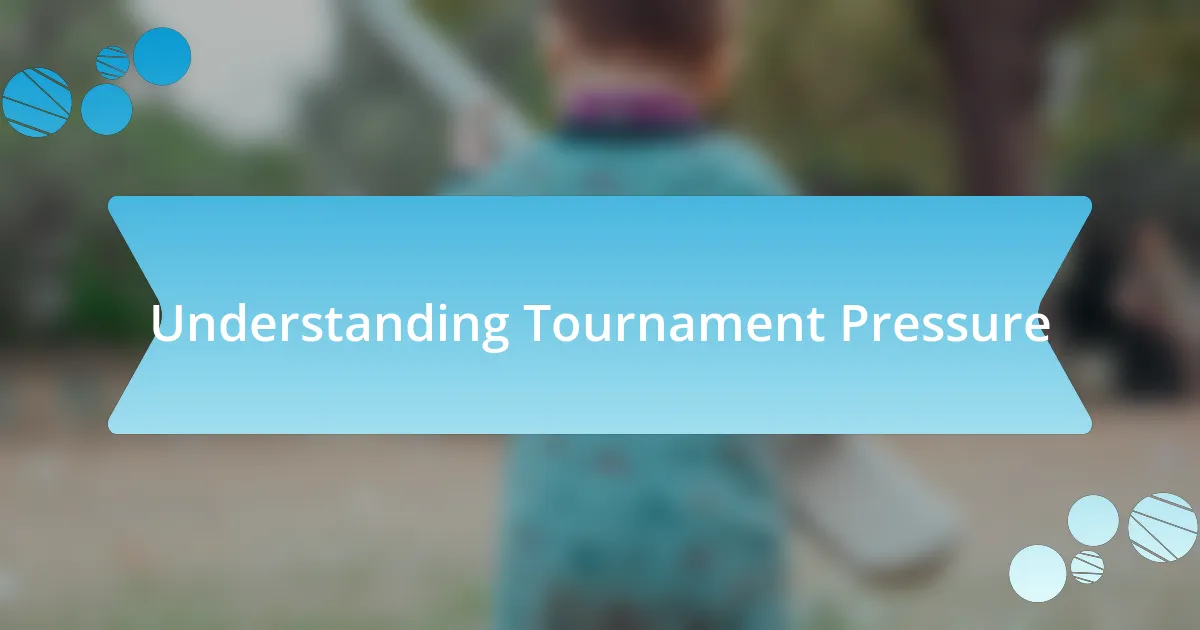
Understanding Tournament Pressure
Tournament pressure is an intense feeling that can stem from various sources, such as high expectations, the fear of failure, or the desire to succeed. I remember my first major tournament vividly, the weight of my coaches’ hopes bearing down on me. It made me wonder—how do we differentiate between motivation and overwhelming pressure?
When I step onto the field, I often feel a rush of adrenaline mixed with anxiety. It’s a delicate balance; that surge can either elevate my performance or leave me paralyzed with fear. I’ve learned to acknowledge that pressure is an inherent part of competitive sports. It makes me question whether I can truly thrive in high-stakes situations or if I’ll crumble under the spotlight.
Understanding tournament pressure goes beyond recognizing its existence—it’s about developing a relationship with it. I’ve found that embracing pressure can transform my mindset. Have you ever considered that pressure could be a friend rather than an enemy? For me, shifting my perspective has made all the difference, turning moments of doubt into opportunities for growth and resilience.

Recognizing Your Stress Signals
Recognizing your stress signals is a crucial step in managing tournament pressure effectively. I’ve had moments where my body sent clear messages before a big game. Sometimes, it’s just a tightness in my chest or butterflies in my stomach. Other times, I notice a slight tremor in my hands that reminds me to pause and breathe. Being in tune with these reactions can help me take proactive steps to calm my nerves.
To help you identify your own stress signals, consider the following cues:
- Increased heart rate or palpitations
- Clenching your jaw or fists
- Sweating more than usual
- Difficulty focusing or making decisions
- Feeling unusually irritable or anxious
By recognizing these signs, you can take a step back and implement strategies to manage your stress more effectively, like deep breathing or visualization techniques. It’s all about becoming aware and responding constructively.
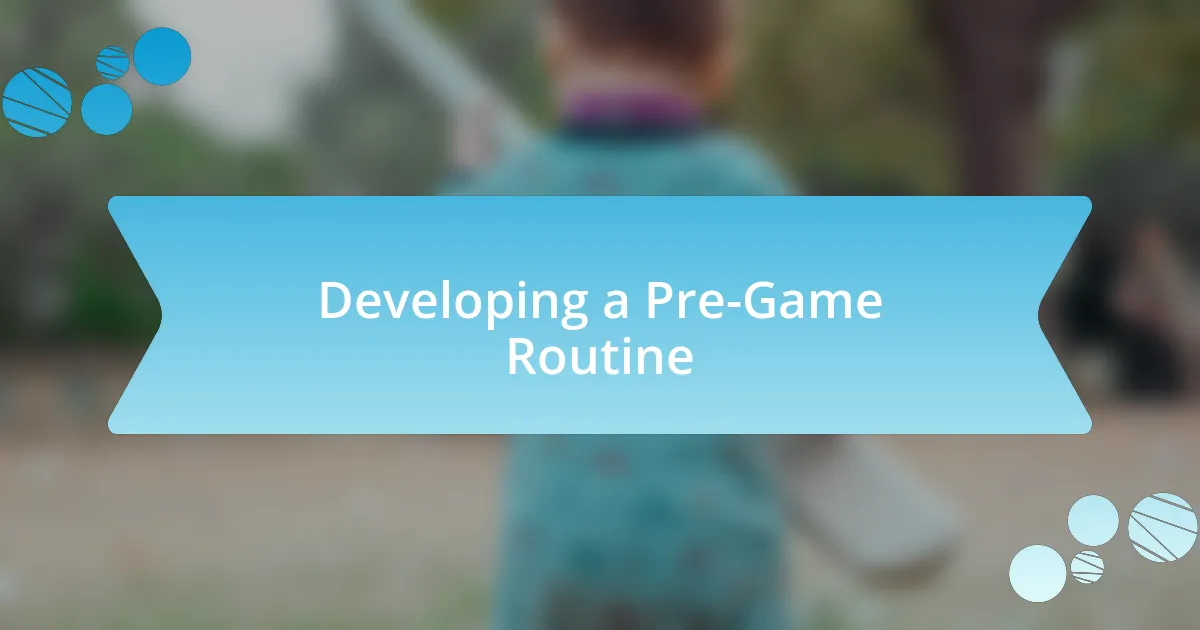
Developing a Pre-Game Routine
Developing a pre-game routine has been one of the most effective strategies in managing my tournament pressure. The consistency of performing the same actions before each match provides me with a sense of control amid the chaos. I often start my routine with light stretching, as it not only warms up my body but also calms my mind, allowing me to step into the game feeling both focused and physically prepared.
Incorporating visualization exercises is another vital part of my pre-game routine. I take a few moments to close my eyes and picture myself performing at my best. This practice has helped me reduce anxiety and build confidence. I recall a tournament where I felt overwhelmed with anticipation; I spent my pre-game moments imagining perfect outcomes. The shift in my mindset transformed my experience during the match.
Additionally, I find that nourishing my body properly before the game plays a key role in how I manage pressure. On days I prioritized healthy meals, I noticed a significant improvement in my energy levels and mental clarity. In contrast, there have been times when I rushed through meals, and I felt sluggish and unfocused.
| Routine Element | Benefits |
|---|---|
| Stretching | Prepares body and calms mind |
| Visualization | Builds confidence and reduces anxiety |
| Healthy Eating | Boosts energy and mental clarity |

Utilizing Visualization Techniques
In my experience, visualization is more than just a mental exercise; it’s a powerful tool that prepares me for the challenges of competition. When I visualize a successful performance, I can almost feel the adrenaline and hear the crowd’s cheers, which immerses me in the moment. Have you ever tried picturing not just the actions but also the emotions you’ll experience during your tournament? The feelings of triumph and accomplishment can make a significant difference in how you approach the game.
There have been times when, before a big match, I sat quietly and envisioned each point I would play. I imagined my movements being fluid, my decisions instinctive, and my confidence unwavering. This technique not only cultivates a positive mindset but also helps embed muscle memory. It’s like rehearsing for a performance; once the match begins, I’m not just reacting—I’m executing a plan that I’ve already seen in my mind.
Sometimes, I think about how visualization can serve as a compass, guiding my focus away from distractions and toward my goals. For instance, during a particularly intense tournament, I closed my eyes and visualized myself overcoming obstacles, turning moments of doubt into opportunities for growth. This shift is incredibly liberating; by seeing success in my mind, I empower myself to manifest it in reality.
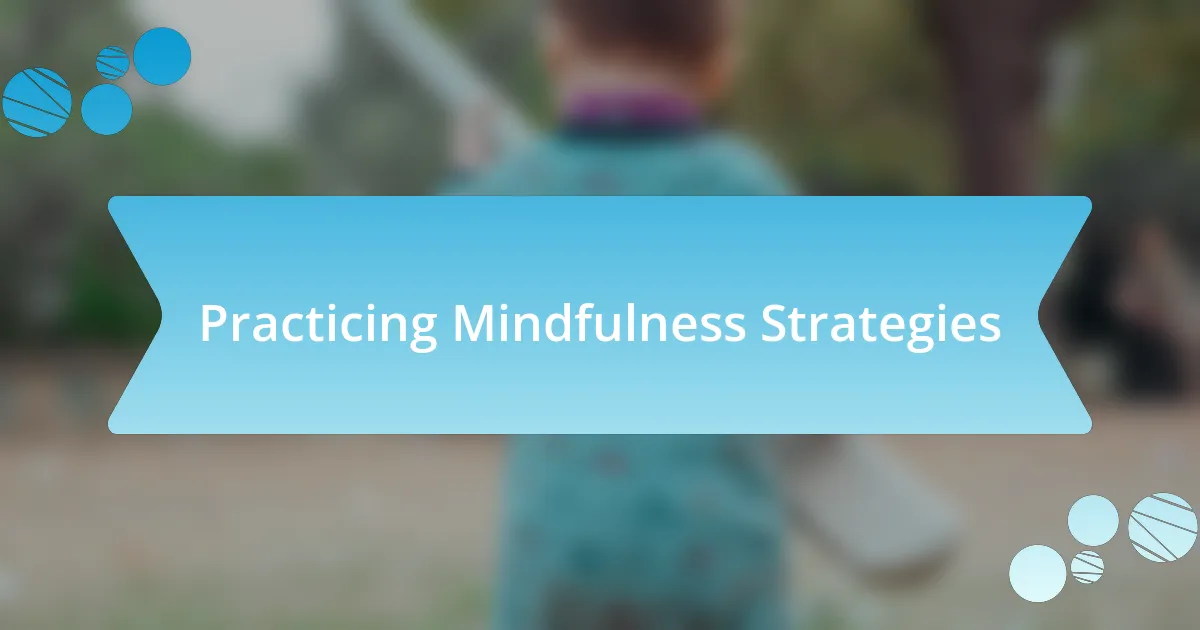
Practicing Mindfulness Strategies
Practicing mindfulness is something I’ve turned to whenever tournament pressure feels overwhelming. Recently, I found myself in a high-stakes match where the tension was palpable. I took a moment to breathe deeply, focusing on the rhythm of my breath, which helped ground me in the present. Have you ever noticed how something as simple as breathing can transform your mindset? It creates a pause, allowing my thoughts to settle and my heart rate to normalize.
One powerful strategy is the ‘body scan’ technique. Before a game, I lie down and mentally scan through each part of my body, observing any tension and releasing it. I remember a match where I could feel stiffness in my shoulders; taking those few minutes to relax made all the difference. It’s like tuning an instrument to ensure that every part is in harmony before performing. The result? I stepped onto the field feeling more aligned and capable.
Another tool I cherish is bringing awareness to my surroundings during practice. I vividly recall a training session where I focused on the sounds of the environment: the rustling of leaves, the chatter of teammates, even my own footsteps. By anchoring my awareness externally, I reduced the noise of nerves and self-doubt inside my head. How often do we let our minds run wild, imagining the worst? Mindfulness encourages us to stay centered, reminding me that the present moment is where the magic happens.

Building a Support Network
Building a strong support network has been a game-changer for me in dealing with tournament pressure. I’ve learned that surrounding myself with positive and understanding people can provide the reassurance I need during those stressful moments. Do you have friends or family members who lift your spirits? I often rely on my closest friends to check in with me before major competitions. Their encouraging words remind me I’m not alone in this journey.
Sharing experiences with fellow athletes has also been incredibly beneficial. I remember a time when I felt particularly anxious before a tournament. I reached out to a teammate who had faced similar challenges. Talking about our fears not only lightened my burden but also built a bond between us. It’s amazing how knowing someone else understands your struggles can help you feel more grounded.
I also value the role of mentors in my support network. I had a coach who would share insightful advice and encouragement tailored to my needs, especially during tough stretches. Their wisdom often served as a guiding light. Have you considered seeking guidance from someone who’s been through it all before? Their perspective can provide clarity and comfort, showing that you’re on the right path, even when the pressure feels intense.

Reflecting on Your Performance
Reflecting on my performance after a tournament is an essential part of my process. I remember one competition where I felt I had underperformed, and instead of dwelling on it, I took a moment to analyze what went wrong. Did I focus on the right things? By identifying my weaknesses, I gained clarity and set specific goals for improvement.
I often jot down my thoughts in a journal after each event. It’s a practice that helps me process not just the outcomes but also my emotions surrounding them. For instance, after one particularly grueling match, I poured my feelings onto the page, detailing everything from my self-doubt to moments of triumph. This act of reflection allowed me to embrace my journey rather than just the results.
Engaging in this reflective practice has taught me to be kinder to myself. I’ve learned that each performance, whether successful or not, offers valuable lessons. Have you ever taken the time to consider not just what you did, but how you felt during competition? Understanding my emotional state has transformed how I approach pressure, turning what once felt like a setback into stepping stones for growth.










